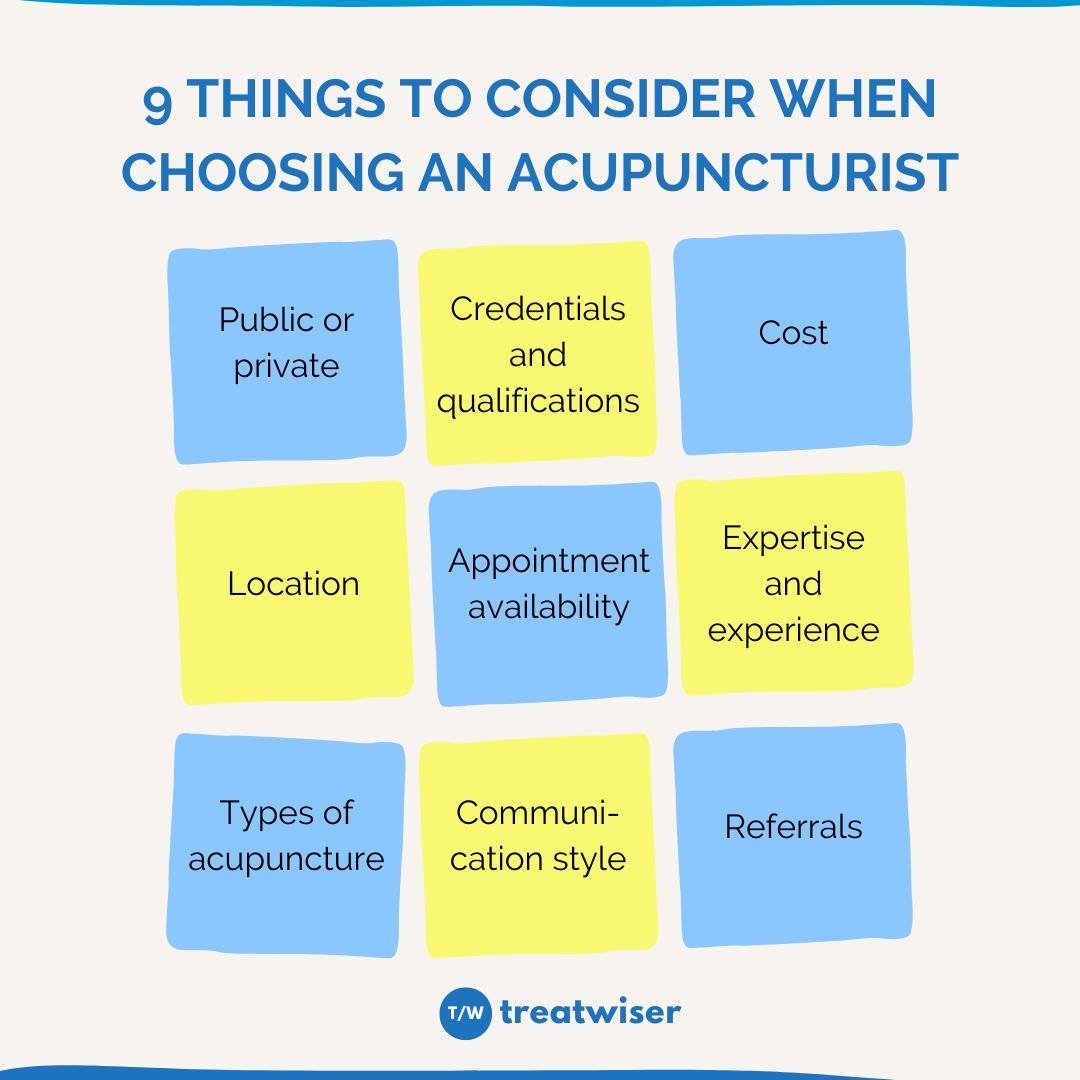Acupuncture is a complementary therapy which involves the insertion of sterilised, fine needles through the skin for preventative and therapeutic reasons. The Chinese who invented acupuncture around 3,000 years ago believed it stimulated the flow of energy in specific points on the body.
Acupuncture may be a good fit for you if you have been searching for a complementary therapy to rebalance your body and restore your health and wellbeing. However, as an unregulated profession in the UK, it is important to ask the right questions before committing to any acupuncturist or treatment plan.
Read on for 9 top tips on how to choose an acupuncturist for you.

1. Public or Private
If you are undergoing or considering acupuncture treatment, it is advisable to first discuss your options with your GP. The NHS (National Health Service) only provides referrals to acupuncture in limited situations, which is provided by GP surgeries or physiotherapists. Due to this, it is common for individuals to seek treatment privately.
2. Credentials and qualifications
Acupuncture is an unregulated profession in the UK. This means that anyone could call themselves an acupuncturist as there are no rules stipulating the level of training and experience required to practice.
Many acupuncturists choose to register with a voluntary professional body. This obliges them to meet certain qualification standards, have active liability insurance and follow a strict code of ethics.
It is strongly recommended that you only choose an acupuncturist who is a member of one of the acupuncture voluntary bodies such as The Acupuncture Society, The Association of Traditional Chinese Medicine or The British Acupuncture Society.
3. Cost
Acupuncture costs can vary considerably. Sessions can start from as low as £25 for a 30-minute session and may rise to as high as £150 for an hourly session. When considering costs, it is also important to understand the full cost of treatment as it may involve a course of sessions. It is typical for a course of treatment to last five to six sessions.
Prices may also vary depending on the type of acupuncture therapy you require. For example, ear acupuncture will be cheaper than full body/cupping.
Some insurance companies may cover acupuncture, so it is a good idea to check first before starting any course of treatment. There may be restrictions on factors such as which acupuncturist you can see and how much you can spend.
4. Location
Acupuncture is an in-person therapy that involves human contact. Although most appointments occur onsite at the acupuncturist, some acupuncturists may be willing to travel to you.
Use complementary therapy directories such as Treatwiser.com to find an acupuncturist near you. Here, you will be able to compare acupuncturists in your area and find ones which are most suitable. Remember to consider factors such as parking, accessibility and proximity to public transport routes.
5. Appointment availability
Appointment availability and waiting times are important factors when choosing an acupuncturist. You want someone who can see you within a reasonable amount of time, who can accommodate your schedule and doesn’t have a long waiting list.
If you are undergoing a course of treatment over multiple sessions it is advisable to see whether there are slots available for you in advance, beyond your first appointment.
6. Expertise and experience
Acupuncturists have different areas of expertise and levels of experience. As such, each one will have different abilities when it comes to meeting your needs and expectations. Many acupuncturists may also offer other holistic therapies and treatments which may be useful.
Research your acupuncturist’s background and their level of experience. Remember to ask the right questions to be comfortable that they have the right expertise and experience. What are their areas of expertise? How many years have they been practicing? Are you comfortable that this is sufficient to help you?
7. Type of acupuncture
There are various types of acupuncture and closely related therapies that you may wish to consider. They include Western Acupuncture, Traditional Chinese acupuncture, Japanese acupuncture, Korean Hand Therapy, Auricular Acupuncture, Scalp Acupuncture, Cupping Therapy and Moxibustion Acupuncture.
We recommend that you take some time to understand the types of acupuncture available and ask your acupuncturist which type they recommend for your specific needs.
8. Communication style
Listen to your intuition as to whether you like or dislike the acupuncturists way of communicating with you on sensitive or personal topics. It’s important to choose someone who is respectful, compassionate to your needs and understands your symptoms and health condition.
Speak to the therapist before making any commitment to ensure that she makes you feel comfortable, respected, and safe. Many therapists are happy to have a free introductory call to ensure that any treatment can work for both of you. If you don’t trust your therapist, you’re less likely to have a positive outcome!
9. Referrals
Online reviews such as those on our therapist listings and word of mouth can be a powerful tool in connecting you with a network of accessible acupuncturists in your area. You might see the results that a close friend has received from working with certain acupuncturists. This can be reassuring and feel more supportive when you go to try it too. However, stay mindful that every individual suits different therapies and what worked for a friend may not work in the same way for you. Their acupuncturist may often be able to point you in the direction of another qualified professional.
Conclusion
We hope that you have gained an increased understanding of how to choose an acupuncturist. Going down the route of trying new complementary therapies can often be daunting at first, so it is important to research and get support if needed.
DISCLAIMER: The Site cannot and does not contain medical / health advice. The medical / health information is provided for general informational and educational purposes only and is not a substitute for professional advice. Accordingly, before seeking any form of medical advice, diagnoses or treatment based upon such information, we encourage you to consult with your GP or other qualified health practitioner. You must never disregard professional medical advice or delay in seeking it because of something mentioned on this Site. The use or reliance of any information contained on the site is solely at your own risk.



